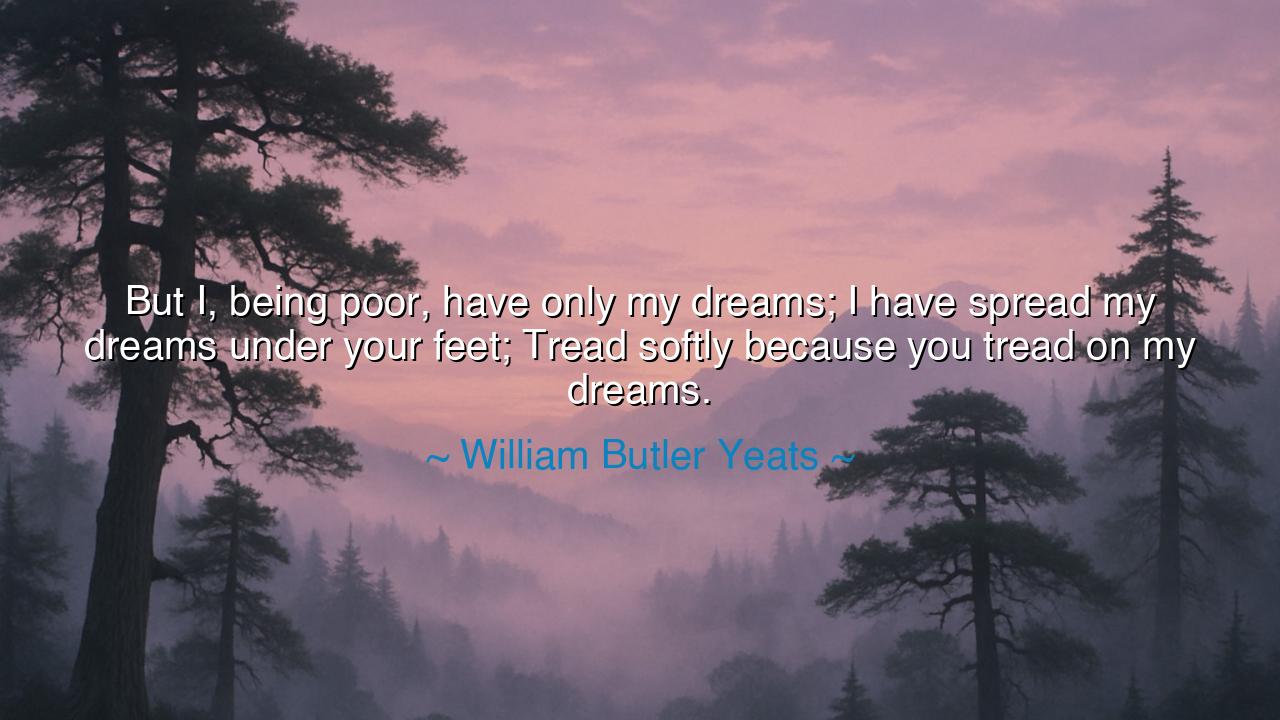
But I, being poor, have only my dreams; I have spread my dreams
But I, being poor, have only my dreams; I have spread my dreams under your feet; Tread softly because you tread on my dreams.






“But I, being poor, have only my dreams; I have spread my dreams under your feet; Tread softly because you tread on my dreams.” — Thus wrote William Butler Yeats, the poet of Ireland’s soul, whose words flow like sacred music between the worlds of love and longing, spirit and sorrow. In this verse, drawn from his poem Aedh Wishes for the Cloths of Heaven, Yeats reveals the most intimate truth of all human hearts: that our dreams — fragile, luminous, and unseen — are the purest offering we can give. To share them is to stand bare before another soul. To accept them is to bear a sacred responsibility.
Yeats begins with humility: “I, being poor, have only my dreams.” The poverty he speaks of is not merely material, but spiritual — the poverty of one who has nothing worldly to give but the treasures of his inner life. The poet has no gold, no silks, no grand inheritance; yet he possesses something rarer — the dream, that precious spark of imagination and hope which sustains the spirit when the world offers nothing else. The poor man, the lover, the artist — all are rich in this invisible wealth.
In the next line, he says, “I have spread my dreams under your feet.” Here, Yeats unveils the vulnerability of the soul in love and trust. To spread one’s dreams beneath another’s feet is to surrender, to lay bare one’s innermost self before the beloved — or perhaps before humanity itself. It is an act of devotion, yet also of danger. For dreams, once shared, are fragile things; they can be crushed by indifference, mocked by the unfeeling, or trampled by the careless. Yeats pleads, therefore, not for pity, but for gentleness: “Tread softly, because you tread on my dreams.”
This final plea is the heart of the poem — both tender and eternal. It speaks not only of romantic love, but of every sacred bond where one soul entrusts its inner world to another. Parents must tread softly upon the dreams of their children; teachers upon the visions of their students; nations upon the hopes of their people. To tread softly is to recognize the divine within each human aspiration — to treat every dream as a flame, small yet capable of lighting the world.
Consider the life of Vincent van Gogh, whose dreams were his only riches. Poor in coin but rich in vision, he poured his soul onto canvas, offering his dreams in colors the world had never seen. Yet in his lifetime, few saw their worth; his works were misunderstood, his spirit bruised by rejection. Still, he laid his dreams before humanity, and though the world trampled them once, time redeemed their beauty. Today, we tread softly before his art, knowing that it was born from suffering and sacred longing.
Yeats’ words remind us that every dream is holy, every hope a tender thing. When someone dares to reveal their dream — whether it be a song, a vision, a confession, or a plan for a better world — they offer us a part of their soul. To scorn it is to wound the spirit; to honor it is to nourish the divine spark within them. The ancients knew this: to destroy another’s dream was to offend the gods, for dreams are the language of the eternal.
The lesson is clear: move gently through the hearts of others. Listen when someone shares their hope; speak kindly when someone shows you their creation. Do not mock what you cannot yet understand. For you walk among fragile worlds — the dreams of those who trust you. And remember, too, to tread softly upon your own dreams: protect them, nurture them, and give them space to grow.
Thus Yeats, in his quiet reverence, speaks for all who have loved, all who have hoped, and all who have dared to dream despite poverty, rejection, or pain. His words echo through time as a prayer to both giver and receiver: be gentle with the unseen, for it is sacred. The poor man’s dream, the artist’s vision, the child’s ambition — all are threads in the cloth of heaven. Walk upon them softly, my friend, for in doing so, you walk upon the very soul of mankind.






AAdministratorAdministrator
Welcome, honored guests. Please leave a comment, we will respond soon